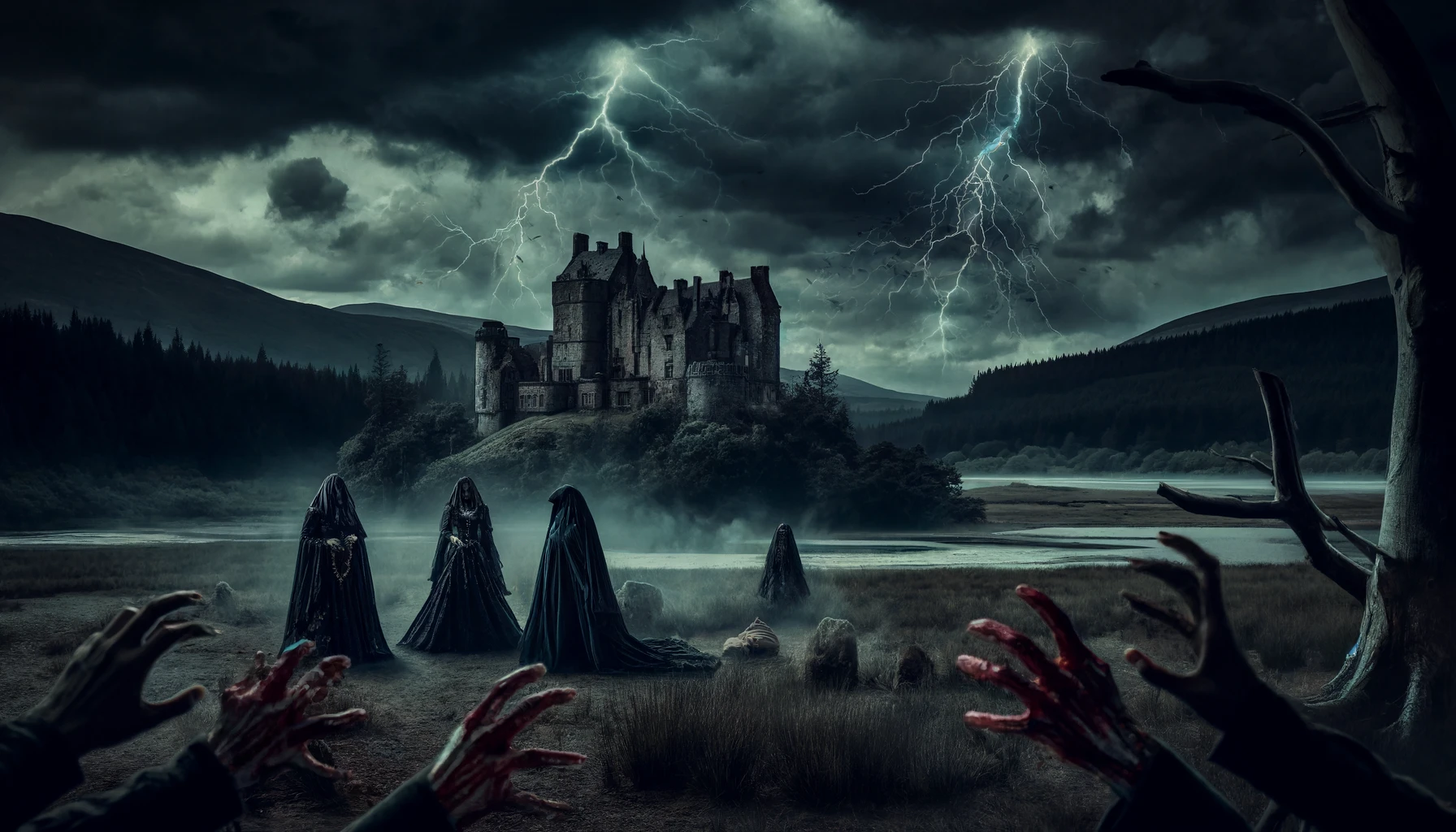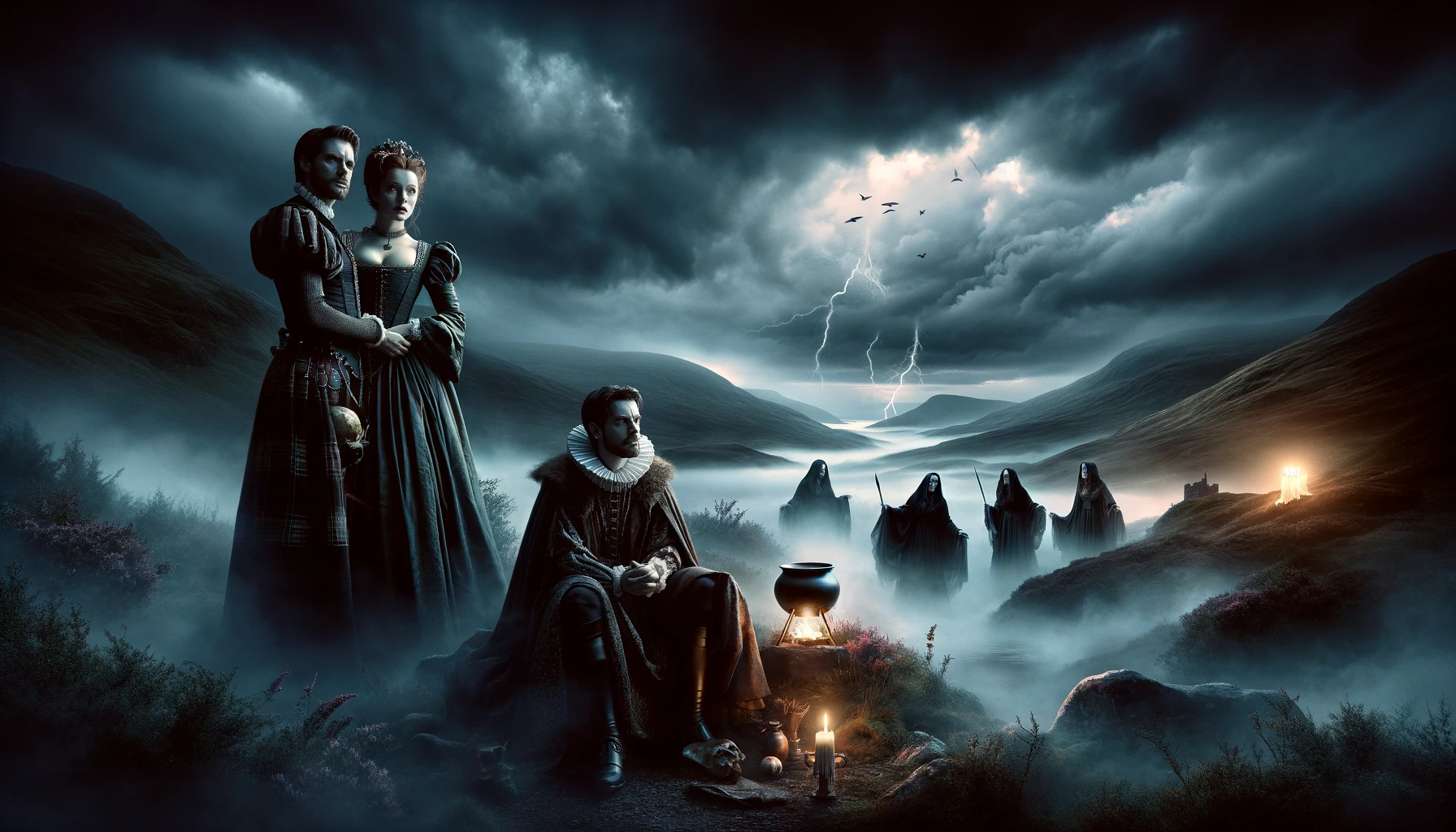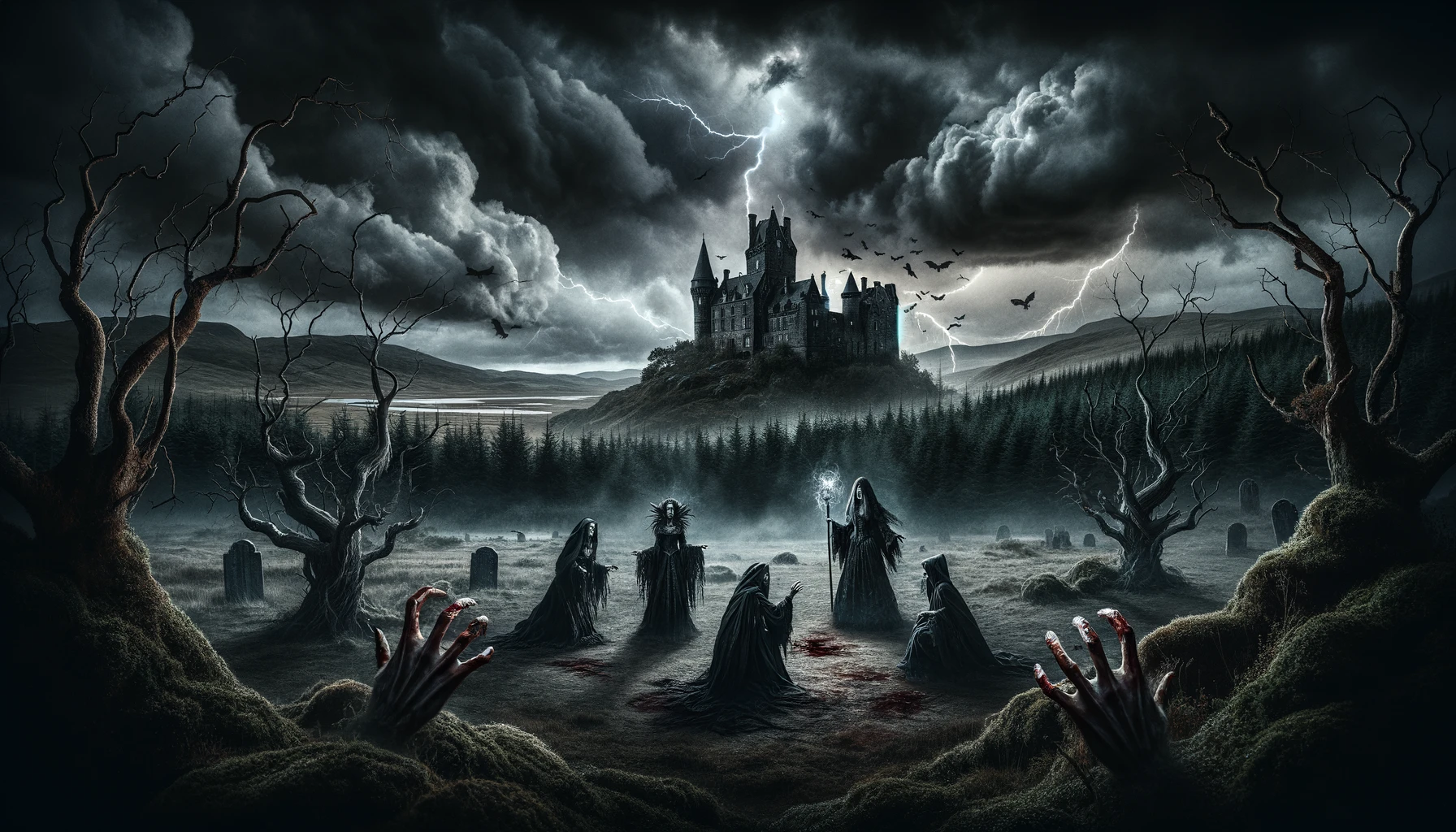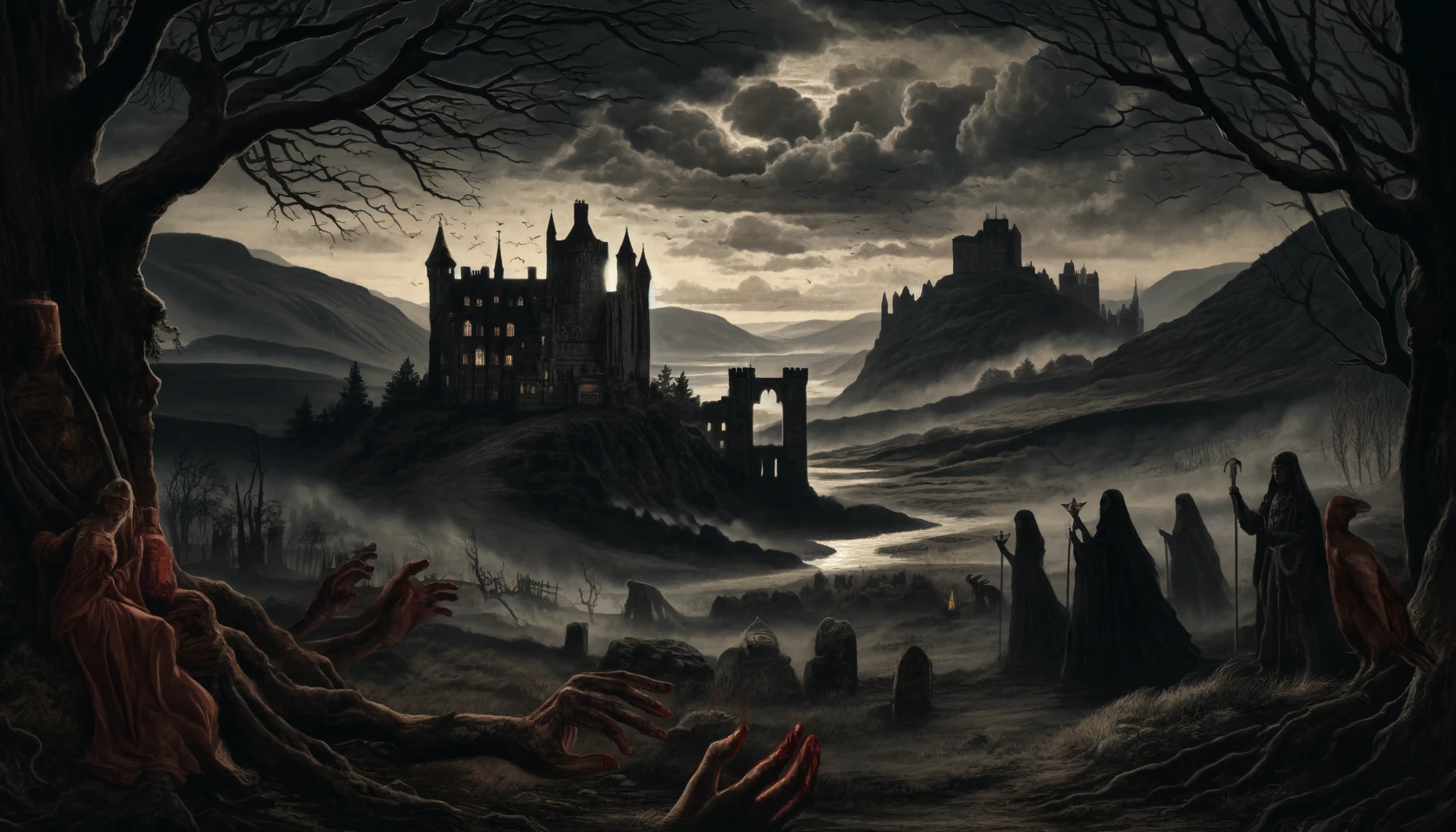William Shakespeare, often heralded as the greatest playwright in the English language, crafted works that have transcended time and culture, with “Macbeth” standing as one of his most profound tragedies. Written in approximately 1606, during the reign of King James I, this play diverges from Shakespeare’s earlier and often more poetic tragedies by delving into the darker aspects of the human psyche and the consequences of ruthless ambition. “Macbeth” is unique in Shakespeare’s body of work for its concise plot and its relentless pursuit of power, which ultimately leads to utter devastation.
At the heart of “Macbeth” are the intertwined themes of power, ambition, and fate. The play explores these through its titular character, who transforms from a respected nobleman into a tyrant, all under the influence of supernatural prophecy and manipulative persuasion. This narrative arc provides a grim commentary on the dangers of aspiring for power without moral restraint.
The historical context of “Macbeth” also enriches its themes. The early 17th century was a period marked by political intrigue and uncertainty, particularly with the ascension of James I, the first monarch to oversee both England and Scotland. Shakespeare incorporates elements of James’s interests, such as witchcraft and the divine right of kings, into “Macbeth,” blending historical elements with dramatic fiction. The play’s depiction of regicide and its chaotic aftermath would have resonated deeply with contemporary audiences, who were acutely aware of the potential for political instability.
“Macbeth” remains a pivotal work in Shakespeare’s oeuvre. It offers a bleak yet insightful reflection on the corrupting power of ambition and the profound consequences that can emerge from disrupting the ordained social and moral order. As we delve deeper into its narrative and thematic complexity, we uncover layers of meaning that continue to resonate with modern audiences, affirming the play’s enduring relevance and Shakespeare’s genius.
Summary
“Macbeth” is set in the stark and foreboding landscapes of medieval Scotland, a setting that mirrors the tumultuous and dark themes of the play. The story begins as Macbeth, a brave Scottish general, returns from a victorious battle alongside his companion Banquo. Their encounter with three witches on a desolate heath marks the pivotal turning point of the play. The witches prophesy that Macbeth will become the Thane of Cawdor and eventually the King of Scotland, while Banquo’s descendants will inherit the Scottish throne. The setting of this eerie meeting sets the tone for the supernatural influences and moral decay that pervade the narrative.
When Macbeth is indeed made Thane of Cawdor shortly after the witches’ prophecy, his ambition is ignited. Encouraged by his wife, Lady Macbeth, who is consumed by her own desires for power and status, Macbeth murders King Duncan, who is a guest in his castle. Duncan’s assassination occurs under the cover of darkness, which is a recurring motif that enhances the play’s focus on evil deeds committed away from the light of virtue and reason. With Duncan’s death, Macbeth ascends to the throne, but his guilt and paranoia spiral out of control.
The setting of the royal castle at Dunsinane becomes a space of escalating tension and madness. Macbeth, now king, is consumed by anxiety and fear of losing his ill-gotten position. He arranges for the murder of Banquo, fearing the witches’ prophecy about Banquo’s heirs. Although Banquo is killed, his son, Fleance, escapes, leaving the prophecy intact and adding to Macbeth’s growing desperation.
As Macbeth’s tyranny extends, he seeks the witches once more, who provide him with misleading assurances that seem to guarantee his safety. However, they also warn him of Macduff, a nobleman who opposes Macbeth’s reign. In a ruthless attempt to secure his position, Macbeth orders the slaughter of Macduff’s wife and children, an act that marks the zenith of his moral decay and sets the stage for his downfall.
Meanwhile, Lady Macbeth, overwhelmed by guilt, descends into madness, sleepwalking and, eventually, taking her own life. As opposition against him mounts, Macbeth clings to the witches’ prophecies for comfort. However, his complacency is shattered when an English-led army, disguised with branches from Birnam Wood, advances on his castle, fulfilling another of the witches’ predictions.
The climax of the play sees Macduff confronting Macbeth. In their encounter, it is revealed that Macduff was “untimely ripped” from his mother’s womb, meaning he was not “born of woman” in the usual way, thus circumventing the witches’ prophecy. Macduff kills Macbeth, restoring moral and social order. Malcolm, Duncan’s son, is declared king, promising a return to peace and justice.
The Scottish setting, with its castles and rugged landscapes, not only heightens the dramatic tension but also symbolizes the natural order that Macbeth disrupts and ultimately seeks to restore. This setting plays a crucial role in reflecting the themes of power, betrayal, and retribution that Shakespeare masterfully explores throughout the tragedy.
 Characters
Characters
- Macbeth: The tragic hero of the play, Macbeth, is initially introduced as a brave and capable warrior. His transformation begins with the witches’ prophecy, which ignites a latent ambition for power. Macbeth’s moral decay is rapid after he decides to murder King Duncan to hasten his rise to power. His subsequent actions, driven by fear and paranoia, only serve to deepen his descent into tyranny and madness. Macbeth’s transformation is a reflection of the corrupting power of unchecked ambition. As he becomes more isolated by his power and guilt, his reliance on violence escalates, ultimately leading to his tragic downfall. Despite his initial nobility, Macbeth becomes a figure of horror, a stark reminder of the destructive potential inherent in the human desire for power.
- Lady Macbeth: Often considered one of Shakespeare’s most complex female characters, Lady Macbeth initially appears more ruthless and ambitious than her husband. She is pivotal in plotting Duncan’s murder, challenging Macbeth’s reluctance, and taking part in the king’s assassination. Her famous invocation of the spirits to “unsex” her reveals her desire to rid herself of any feminine weakness, aligning her with darker forces. However, her involvement in regicide haunts her, leading to a gradual disintegration of her mental stability. Her descent into madness, culminating in her sleepwalking scene where she attempts to wash imagined blood from her hands, is starkly contrasted with her earlier assertive persona. Lady Macbeth’s tragic end, implied to be suicide, underscores the personal cost of their shared ambition.
- The Witches: The three witches, or the Weird Sisters, introduce a supernatural element to “Macbeth,” serving as both instigators and instruments of fate. Their prophecies are deliberately equivocal, sowing the seeds of ambition in Macbeth while offering enough ambiguity to fuel his subsequent interpretations and actions. Their role can be viewed as a catalyst that exposes Macbeth’s inherent flaws rather than a definitive dictation of fate. The witches embody the theme of fate versus free will, as their prophecies prompt Macbeth to act in ways that ensure their fulfillment. The ambiguity of their influence invites discussions about the extent of their impact versus the agency of the characters.
Secondary Characters
- Banquo: As Macbeth’s counterpart, Banquo serves as a foil to highlight Macbeth’s moral fall. He also receives a prophecy from the witches but chooses not to act on it, illustrating the theme of free will versus destiny. His ghost later haunts Macbeth, symbolizing Macbeth’s guilt and the consequences of his betrayal.
- Macduff: He emerges as the nemesis of Macbeth. Unlike Macbeth, Macduff acts out of a genuine concern for Scotland’s welfare. His decision to flee to England to gather forces against Macbeth is driven by loyalty to his country, not personal ambition. Macduff’s role climaxes in the final act when he confronts and kills Macbeth, fulfilling the witches’ prophecy in a manner unexpected by Macbeth.
- Duncan: The virtuous King Duncan’s murder is the pivotal crime of the play and symbolizes the unnatural upheaval of the natural order. His character represents legitimate leadership, and his murder triggers the chaos and tyranny that follow under Macbeth’s rule.
- Malcolm: The elder son of Duncan, Malcolm’s journey from a fledgling leader to a rightful king mirrors a restoration of order. His prudent, measured approach to reclaiming the throne contrasts sharply with Macbeth’s tyrannical path to power.
Each character in “Macbeth” not only contributes to the plot’s advancement but also encapsulates different aspects of human natureand the play’s central themes. From the valour of Macduff to the tragic ambition of the Macbeths, Shakespeare crafts a complex narrative web, demonstrating the multifaceted nature of ambition, guilt, and leadership. The interplay between these characters enriches the drama, making “Macbeth” an exploration of the depths of human nature and the consequences of our choices.
Major Themes in “Macbeth”
Ambition and Power
“Macbeth” serves as a poignant exploration of the dangers inherent in unchecked ambition and the pursuit of power. Macbeth himself is initially depicted as a valorous nobleman, but the prophecy given by the witches ignites a burning desire for power that rapidly consumes him. His ascent to the throne via regicide marks a moral descent that is accelerated by his ambition. As Macbeth succumbs to the intoxicating allure of power, he becomes increasingly tyrannical and paranoid, leading to further bloodshed and cruelty. Lady Macbeth’s ambition is no less significant; her urging of Macbeth to kill King Duncan propels both of them into a spiral of guilt, madness, and despair. The theme vividly illustrates how ambition can distort moral judgment and lead to self-destruction.
Fate vs. Free Will
The tension between fate and free will is a central spine of “Macbeth.” The witches’ prophecies are cryptic and suggest a preordained future, yet it is Macbeth’s actions, spurred by his interpretation of their words, that fulfill these prophecies. Shakespeare cleverly leaves the audience to ponder whether Macbeth is merely a pawn of destiny or a free agent who makes catastrophic choices. This ambiguity is mirrored in Banquo’s more measured response to his prophecy, suggesting that while fate sets the scene, characters are compelled by their decisions. The play thereby delves deep into the philosophical debate about whether humans are driven by fate or their free will, a question that remains relevant in the modern world.
Guilt and Conscience
Guilt is a motif that runs through the entirety of “Macbeth,” affecting its central characters in profound ways. Macbeth, who is initially a noble hero, is quickly consumed by guilt following Duncan’s murder. This guilt manifests as hallucinations and paranoia, leading him to commit more atrocities in an attempt to secure his power. Contrastingly, Lady Macbeth, who initially appears untroubled by the deeds, eventually succumbs to an all-consuming guilt that leads to her mental breakdown and death. The different trajectories of Macbeth and Lady Macbeth’s guilt illustrate the psychological realism of Shakespeare’s characters; their guilt reflects their internal moral struggles and ultimate recognition of their crimes, underscoring the play’s deep explorations of ethical and psychological complexity.
The Natural vs. The Unnatural
Throughout “Macbeth,” the natural world reflects the corruption and disruption of the social order. The murder of Duncan, a king appointed by divine right, triggers unnatural occurrences, from horses eating each other to days turning into night. These phenomena are not just dramatic effects but signify the upheaval of the natural order that Macbeth’s actions have wrought. The theme of the unnatural extends to the characters themselves, from the witches who defy natural laws to Lady Macbeth’s plea to be unsexed, seeking to deny her natural feminine qualities to pursue power. This disruption of nature acts as a potent symbol of the moral and ethical corruption at the heart of the play, underscoring the catastrophic consequences of Macbeth’s usurpation of power.
These themes of ambition, fate, guilt, and the natural versus the unnatural are interwoven to create a complex narrative that examines the depths of human nature and the consequences of our actionShakespeare’se”s “Macbth” not only entertains but also provokes reflection on these enduring human concerns, maintaining its relevance across the centuries.
Symbolism and Imagery in “Macbeth”
Shakespeare’s use of symbolism and imagery in “Macbeth” enriches the play’s themes, adding layers of meaning that resonate through its action and dialogue. The recurring symbols of blood, darkness, and weather are particularly potent, reflecting the unfolding moral and physical chaos.
Blood
Blood is perhaps the most striking and frequently referenced symbol throughout “Macbeth.” Initially, blood represents honour and bravery, as seen in the bloody sergeant’s description of Macbeth’s valour on the battlefield. However, as the play progresses, blood comes to symbolize guilt and the stain of crime. After murdering King Duncan, Macbeth stares at his bloody hands and says, “This is a sorry sight,” reflecting his immediate sense of guilt. The transition of blood from a symbol of honour to one of guilt and horror is encapsulated in Lady Macbeth’s desperate attempt to wash away the “damned spot” from her hands, illustrating that the psychological burden of their crimes is inescapable and indelible. This symbol hauntingly tracks the path from glory to damnation, encapsulating the moral decay of the protagonists.
Darkness
Darkness in “Macbeth” is omnipresent and serves as a cover for the most heinous deeds. The cover of night is repeatedly called upon to hide the wrongdoings and intentions of the characters, such as when Lady Macbeth invokes the “thick night” to come with the “smoke of hell” so that her knife does not see the wound it makes. The frequent use of darkness reflects the themes of ambiguity and hidden motives. It also creates a foreboding atmosphere that is palpable throughout the play, symbolizing the moral blindness and despair into which Macbeth and Lady Macbeth descend. The enveloping darkness mirrors the increasing depravity of their actions and the chaos that ensues from their usurpation of power.
Weather
Weather in “Macbeth” often symbolizes the response of the universe to events occurring on the human plane. The play opens with thunder and lightning, setting a tumultuous tone that forecasts the violent and disorderly events to follow. The stormy weather associated with the witches also highlights their connection to the supernatural and their role in influencing Macbeth. These atmospheric disturbances are not merely background; they react to the disturbances in the moral and social order. For instance, after Duncan’s murder, Ross notes that the day is unusually dark and that “dark night strangles the travelling lamp,” which suggests that nature itself is mourning the king’s unnatural death. This use of weather enhances the sense of a cosmos thrown into disarray by Macbeth’s regicide and his subsequent tyranny.
Imagery
Shakespeare further employs powerful imagery to reinforce the play’s themes. The imagery of sickness is used to describe Scotland under Macbeth’s rule, portraying the country as diseased and in need of healing. Metaphors and similes relating to illness permeate the dialogue, indicating the unnatural state of affairs and the need for a cure, which Macduff ultimately provides by dethroning Macbeth. Similarly, animal imagery is used to reflect the predatory and violent aspects of Macbeth’s character, such as when he is described as a “raven” and later a “wolf.” These comparisons to wild and dangerous animals emphasize his devolution from human to beast, a transformation driven by his unchecked ambition.
Through these symbols and imagery, Shakespeare not only deepens the audience’s engagement with the narrative but also underscores the central themes of the play: the corrupting power of unchecked ambition, the impact of moral choices, and the disruption of the natural order. Each element serves to weave a richer tapestry of meaning, making “Macbeth” a masterful study of how personal actions can resonate with universal consequences.
 Historical and Cultural Context of “Macbeth”
Historical and Cultural Context of “Macbeth”
“Macbeth” was written and first performed in the early 17th century, a period marked by significant political and cultural shifts in England. The play was likely first staged in 1606, three years after James I ascended to the English throne following the death of Elizabeth I. James was not only the monarch of England but also of Scotland, making Shakespeare’s Scottish-themed play particularly topical. The historical and cultural context of the time deeply influenced the themes and settings of “Macbeth,” reflecting the concerns and interests of the Jacobean era, particularly regarding kingship, the supernatural, and moral questions.
Political and Historical Context
The political environment under James I was fraught with anxiety and intrigue. The Gunpowder Plot of 1605, in which Catholic conspirators attempted to assassinate the king and destroy Parliament, heightened fears of political assassination and instability. Shakespeare’s portrayal of the assassination of King Duncan can be seen as a direct reflection of these anxieties. Furthermore, James I’s interest in witchcraft, he authored a treatise titled “Daemonologie” that endorsed the witch hunts, would have made the inclusion of the three witches particularly resonant with contemporary audiences.
Elizabethan Attitudes towards Kingship
During the Elizabethan and Jacobean eras, the king was considered God’s direct representative on Earth. Regicide, therefore, was seen not only as a political crime but as a sin against God. This is reflected in “Macbeth” through the natural disturbances that follow Duncan’s murder, symbolizing the universe’s reaction to the unnatural act of killing a king. The theme of legitimate versus illegitimate rule is central to the play, as Macbeth’s unlawful rise to power results in tyranny and misery, contrasting with the rightful rule exemplified by King Duncan and, later, Malcolm.
The Supernatural and Morality
The supernatural plays a significant role in Macbeth, mirroring the period’s fascination with witchcraft and the occult. The witches in Macbeth manifest this interest, and their prophecies drive the plot of the play. Their presence reflects the Elizabethan belief in a cosmos where the supernatural could directly interact with the mundane world, influencing it in profound ways.
The moral questions explored in “Macbeth” are deeply tied to these themes of kingship and the supernatural. The play examines the moral fallout of ambition, the breach of natural order, and the consequences of usurping power. Shakespeare’s exploration of these themes through the character of Macbeth serves as a cautionary tale about the dangers of overreaching ambition and moral corruption, resonating with his audience’s beliefs and fears.
In sum, “Macbeth” is steeped in the historical and cultural contexts of its time, reflecting the political uncertainties, the fascination with the supernatural, and the deep moral questions that pervaded the era. Shakespeare’s work not only entertained but also engaged with the most pressing issues of his time, ensuring the play’s lasting impact and relevance.
Performance History of “Macbeth”
Since its inception, “Macbeth” has enjoyed a rich performance history, with each era’s reinterpretation adding layers of complexity and depth to its reception and understanding. The play has been adapted and performed across diverse mediums and cultural contexts, reflecting its universal themes and adaptability to different social and political climates.
Notable Performances
The earliest recorded performance of “Macbeth” was in 1611 at the Globe Theatre in London, and it has been a staple of the stage ever since. During the Restoration, the play was adapted by William Davenant, introducing musical numbers and enhancing the roles of the witches in line with the tastes of the time. In the 19th century, actors such as Edmund Kean and William Charles Macready brought new psychological depth to the character of Macbeth, focusing on the internal conflict and tragic nature of the protagonist.
In the 20th century, “Macbeth” saw innovative and politically charged productions, such as Orson Welles’ 1936 version, which was set against the backdrop of the Haitian revolution and emphasized themes of tyranny and power. The 1976 Royal Shakespeare Company production starred Ian McKellen and Judi Dench, directed by Trevor Nunn, and was noted for its intense, almost claustrophobic atmosphere, highlighting the psychological torment of the Macbeths.
Impact of Different Interpretations
Each reinterpretation of “Macbeth” has contributed to a deeper understanding of its themes and characters. For example, modern productions often highlight themes of ambition and power by setting the play in contemporary contexts, such as corporate boardrooms or modern dictatorships, making it relevant to a 21st-century audience. Feminist readings have re-evaluated Lady Macbeth’s role, seeing her not just as a villainous instigator but as a complex character shaped by her circumstances and societal constraints.
Adaptations in film and television have also broadened the play’s reach and impact. Notable film versions include Roman Polanski’s 1971 film, which emphasized the violence and brutality of the Scottish setting, and Justin Kurzel’s 2015 adaptation, which focused on the psychological battle faced by Macbeth and his wife.
Through its varied performances, “Macbeth” continues to be a mirror reflecting the concerns and issues of each generation. It demonstrates the timeless nature of Shakespeare’s work and its capacity to engage with audiences across different epochs and cultures. Each performance, whether on stage or on screen, invites a new interpretation and understanding of this deep and enduring tragedy.
Critical Reception and Legacy of “Macbeth”
“Macbeth” has been one of Shakespeare’s most enduring and frequently performed tragedies, commanding both critical and popular attention through the centuries. Its reception has evolved, reflecting changing cultural and social values, yet its core themes of ambition, power, and guilt continue to resonate with audiences worldwide.
Critical Reception Over Time
Initially, “Macbeth” was likely appreciated for its dramatic intensity and its exploration of regicide—a topic of great relevance in the aftermath of the Gunpowder Plot of 1605. Throughout the 17th and 18th centuries, the play was often adapted to fit the tastes and sensibilities of the time, sometimes to the extent of altering significant elements, like the ending or key scenes, to suit more moralistic or heroic frameworks.
In the 19th century, as Romantic critics and audiences came to value Shakespeare for his exploration of the human psyche, “Macbeth” was celebrated for its deep psychological and existential themes. Figures such as Samuel Taylor Coleridge and, later, Victorian scholars dissected the play’s moral and psychological complexity, enhancing its status in the canon of English literature.
The 20th century brought a more nuanced understanding of its themes, particularly through psychoanalytic lenses. Critics like A.C. Bradley delved into Macbeth’s character as a tragic hero whose fatal flaw is his ambition. Modern criticism has continued to explore themes of gender, power, and identity, reflecting contemporary concerns.
Influence on Modern Literature and Popular Culture
“Macbeth” has exerted a profound influence on modern literature and popular culture. Its themes have been adapted to various settings and genres, from contemporary novels to films and television series. The concept of a tragic hero corrupted by ambition has become a staple in literature, and phrases from the play, such as “full of sound and fury” or “something wicked this way comes,” have permeated popular culture.
The play has inspired countless works, including novels such as Nikolai Leskov’s “Lady Macbeth of Mtsensk” and its opera adaptation by Dmitri Shostakovich and films like Akira Kurosawa’s “Throne of Blood,” which transposes the story to feudal Japan. In theatre, “Macbeth” has been reimagined in diverse cultural contexts, demonstrating its universal appeal and adaptability.
The legacy of “Macbeth” in education is significant, with the play being a staple in school curricula around the world. This ensures that new generations continue to engage with the play, examining its themes and characters in light of current global issues and personal experiences.
Overall, “Macbeth” remains a cornerstone of English literature, its critical reception and influence reflecting its complexity and the universal relevance of its themes. As society continues to grapple with issues of power, ambition, and morality, “Macbeth” likely will continue to inspire and provoke discussion for future generations.


